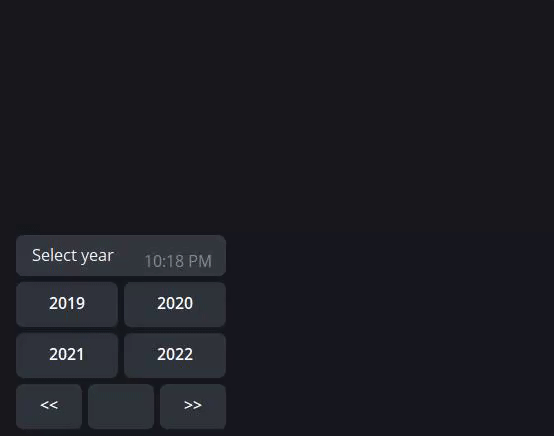
Research
Security News
Malicious npm Package Targets Solana Developers and Hijacks Funds
A malicious npm package targets Solana developers, rerouting funds in 2% of transactions to a hardcoded address.
python-telegram-bot-calendar
Advanced tools
Very simple inline calendar for your bot.

This library is tested on Python 3.6 and 3.7.
pip install python-telegram-bot-calendar
There is one main class - DetailedTelegramCalendar that can be used as follows. This is the example for pyTelegramBotAPI library. Other libraries are also supported.
from telegram_bot_calendar import DetailedTelegramCalendar, LSTEP
...
@bot.message_handler(commands=['start'])
def start(m):
calendar, step = DetailedTelegramCalendar().build()
bot.send_message(m.chat.id,
f"Select {LSTEP[step]}",
reply_markup=calendar)
@bot.callback_query_handler(func=DetailedTelegramCalendar.func())
def cal(c):
result, key, step = DetailedTelegramCalendar().process(c.data)
if not result and key:
bot.edit_message_text(f"Select {LSTEP[step]}",
c.message.chat.id,
c.message.message_id,
reply_markup=key)
elif result:
bot.edit_message_text(f"You selected {result}",
c.message.chat.id,
c.message.message_id)
In start handler the calendar is created. Several arguments can be passed:
calendar_id - small integer or string, used for calendar identification. It used when you need several different calendars (default - 0)current_date - datetime.date object, initial date value (default - today date)additional_buttons - 1D list of buttons that will be added to the bottom of the calendarlocale - either en, ru, or eo, can be added moremin_date and max_date - both are used as min and max values for the calendarAs you can see, special function that is provided should be passed to callback query handler. It will automatically work. The function takes only one argument - calendar_id that is 0 by default.
In the body of the handler function you need to call process function on callback data. WARNING! You need to create the calendar object again if it was not saved before.
The function process return tuple of size 3 - result, keyboard, step.
result - datetime.date object if user finished selecting. Otherwise Nonekeyboard - inline keyboard markup if the result is not ready. Otherwise Nonestep - YEAR, MONTH, or DAY if not ready. None is also possible if there is no change in keyboard.You can create as many calendars as you want. However, in order to handle them properly set different calendar_id's when you want to distinguish them. Take a look at examples.
In the class constructor min_date and max_date - both are used as min and max values for the calendar. If you add them, the calendar will not show undesired dates. Example:

You can also write your own code. One of the examples is redefining the steps order.
In the package you can find WMonthTelegramCalendar and WYearTelegramCalendar that start from day and month selecting, not from year.
You can also redefine style parameters. Example:
class MyStyleCalendar(DetailedTelegramCalendar):
# previous and next buttons style. they are emoji now!
prev_button = "⬅️"
next_button = "➡️"
# you do not want empty cells when month and year are being selected
empty_month_button = ""
empty_year_button = ""
You will get:

your_translation_months = list('abcdefghijkl')
your_translation_days_of_week = list('yourtra')
class MyTranslationCalendar(DetailedTelegramCalendar):
def __init__(self, **kwargs):
super().__init__(**kwargs)
self.days_of_week['yourtransl'] = your_translation_days_of_week
self.months['yourtransl'] = your_translation_months

Contributions are what make the open source community such an amazing place to be learn, inspire, and create. Any contributions you make are greatly appreciated.
git checkout -b feature/yourFeature)git commit -m 'Add some yourFeature')git push origin feature/yourFeature)This project is licensed under the MIT License - see the LICENSE file for details
FAQs
Python inline calendar for telegram bots
We found that python-telegram-bot-calendar demonstrated a healthy version release cadence and project activity because the last version was released less than a year ago. It has 1 open source maintainer collaborating on the project.
Did you know?

Socket for GitHub automatically highlights issues in each pull request and monitors the health of all your open source dependencies. Discover the contents of your packages and block harmful activity before you install or update your dependencies.

Research
Security News
A malicious npm package targets Solana developers, rerouting funds in 2% of transactions to a hardcoded address.

Security News
Research
Socket researchers have discovered malicious npm packages targeting crypto developers, stealing credentials and wallet data using spyware delivered through typosquats of popular cryptographic libraries.

Security News
Socket's package search now displays weekly downloads for npm packages, helping developers quickly assess popularity and make more informed decisions.